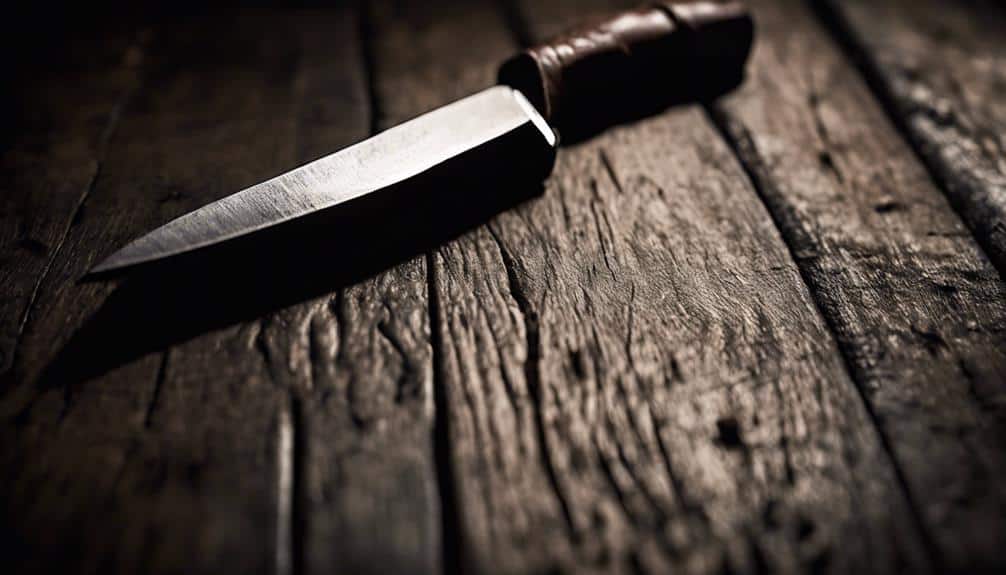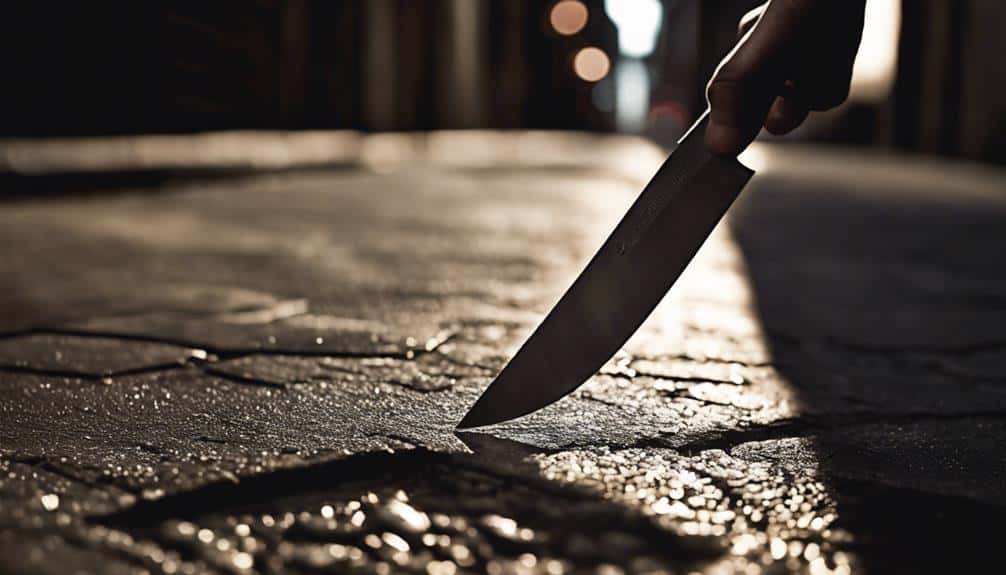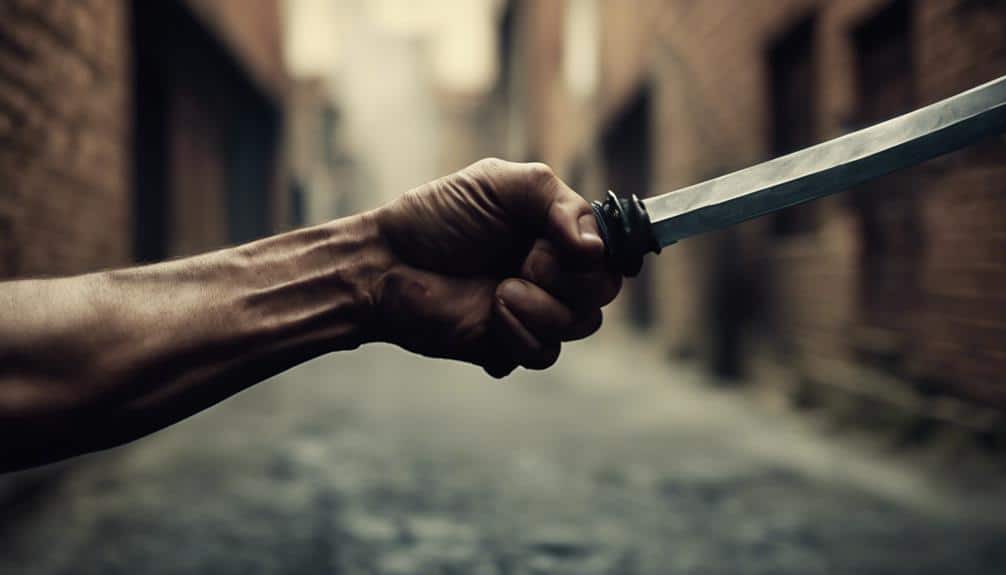Expand or Slash? Unpacking the Pros and Cons of Expandable Batons and Knives in Self-Defense
So, you’re deciding between an expandable baton or a knife for self-defense, huh? Imagine transforming into a safe-distance champion with a baton, which gives attackers that “keep back” warning. They’re portable, easy to handle, and non-lethal, making them your trusty sidekick. But, let’s not dismiss knives too quickly—they’re the stealthy contenders, excelling in close encounters with an edge that’s hard to beat. Just remember, they require serious skill to avoid mishaps. There’s also the whole legality dance to weigh, especially since laws can be a tad tricky. Curious to explore which hero tool fits your personal defense saga?
 In the domain of self-defense, choosing the right tool can greatly impact your safety and confidence. You might find yourself in a situation where having an expandable baton tucked away could be a game-changer. It’s compact and easy to carry, unlike a knife that demands a more deliberate motion to deploy. Imagine fending off an attacker while maintaining a safe distance; expandable batons offer a longer striking range, keeping you out of harm’s reach. It’s like having an extra-long arm that doesn’t need to get too close to the danger zone. With options like the 12 Inch Telescopic Steel Baton available for effective self-defense, the benefits are clear.
Now, let’s talk about training. With an expandable baton, you can feel a surge of confidence as you practice. It’s empowering to know you can deliver effective strikes without the same risk of causing lethal harm as a knife. While knives can be seen as more lethal and require extensive practice to wield confidently, a baton feels different. It’s about control, not just cutting.
Of course, every tool has its legal nuances. Like knives, batons are classified differently depending on where you are, but they often don’t carry the same immediate perception of lethality. So, which tool suits you best?
In the domain of self-defense, choosing the right tool can greatly impact your safety and confidence. You might find yourself in a situation where having an expandable baton tucked away could be a game-changer. It’s compact and easy to carry, unlike a knife that demands a more deliberate motion to deploy. Imagine fending off an attacker while maintaining a safe distance; expandable batons offer a longer striking range, keeping you out of harm’s reach. It’s like having an extra-long arm that doesn’t need to get too close to the danger zone. With options like the 12 Inch Telescopic Steel Baton available for effective self-defense, the benefits are clear.
Now, let’s talk about training. With an expandable baton, you can feel a surge of confidence as you practice. It’s empowering to know you can deliver effective strikes without the same risk of causing lethal harm as a knife. While knives can be seen as more lethal and require extensive practice to wield confidently, a baton feels different. It’s about control, not just cutting.
Of course, every tool has its legal nuances. Like knives, batons are classified differently depending on where you are, but they often don’t carry the same immediate perception of lethality. So, which tool suits you best?
 You might find expandable batons to be convenient and discreet, but they come with their own set of challenges. As nifty self-defense weapons, they might seem like the perfect pocket-sized protector. However, their compact design can sometimes lack the oomph needed for impactful strikes. Envision swinging a baton, only to find it doesn’t pack the punch you expected. That’s a bit of a letdown, right? Additionally, consider the options available, such as the Repeller Stun Baton which boasts an impressive 40,000,000 volts for more effective deterrence.
Now, envision this: you’re in a tense situation, adrenaline pumping, and your trusty baton refuses to lock into place. It’s like trying to eat soup with a fork—frustrating and ineffective. Some models even bend under pressure, making you wonder if they’re more like bendy straws than reliable self-defense weapons.
And let’s talk reach. While handy in close quarters, expandable batons can leave you wishing for just a bit more distance when things get dicey. Plus, like any skill, wielding a baton requires practice. Without it, you might fumble when it counts most, feeling as clumsy as a cat on roller skates.
You might find expandable batons to be convenient and discreet, but they come with their own set of challenges. As nifty self-defense weapons, they might seem like the perfect pocket-sized protector. However, their compact design can sometimes lack the oomph needed for impactful strikes. Envision swinging a baton, only to find it doesn’t pack the punch you expected. That’s a bit of a letdown, right? Additionally, consider the options available, such as the Repeller Stun Baton which boasts an impressive 40,000,000 volts for more effective deterrence.
Now, envision this: you’re in a tense situation, adrenaline pumping, and your trusty baton refuses to lock into place. It’s like trying to eat soup with a fork—frustrating and ineffective. Some models even bend under pressure, making you wonder if they’re more like bendy straws than reliable self-defense weapons.
And let’s talk reach. While handy in close quarters, expandable batons can leave you wishing for just a bit more distance when things get dicey. Plus, like any skill, wielding a baton requires practice. Without it, you might fumble when it counts most, feeling as clumsy as a cat on roller skates.
 When you’re thinking about knives for self-defense, you’re stepping into a world with a few serious hurdles. First, using a knife means getting up close and personal with your attacker, which isn’t exactly a walk in the park and skyrockets the chances of getting hurt. Plus, there’s the legal stuff—knives often come with more red tape and raised eyebrows, not to mention the skill level needed to wield one without accidentally turning yourself into a human pin cushion or slicing up the wrong target!
When you’re thinking about knives for self-defense, you’re stepping into a world with a few serious hurdles. First, using a knife means getting up close and personal with your attacker, which isn’t exactly a walk in the park and skyrockets the chances of getting hurt. Plus, there’s the legal stuff—knives often come with more red tape and raised eyebrows, not to mention the skill level needed to wield one without accidentally turning yourself into a human pin cushion or slicing up the wrong target!
The emotional rollercoaster of using a knife in self-defense can be wild. It might be seen as excessive force, leading to serious legal trouble. So, before you consider a knife for protection, get cozy with your local laws, or you might end up in a courtroom drama instead of a self-defense success story!
Now, you must stay sharp (pun intended!) about local laws. In some places, carrying a baton is as easy as pie, but elsewhere, you might need a permit. On the flip side, knives can land you in hot water with stricter rules. It’s vital to understand how these weapon classification differences affect your choices. Be smart, stay informed, and avoid those dreaded legal mishaps. Carry wisely, and you’ll be ready for anything life throws your way!
 To effectively wield an expandable baton for self-defense, it’s crucial to undergo thorough training that hones your striking techniques, shifts, and control holds. Imagine you’re a ninja, but without the fancy outfits or dramatic entrances. Training sharpens your skills, making you a maestro of baton moves when the time calls for it. Regular practice is your secret sauce, helping you stay cool and confident under pressure, like a hero in an action movie. Using a Telescopic Steel Baton will enhance your training experience, as its durable construction and ergonomic handle design provide a reliable tool for practice.
Picture this: you’re in a class, learning the art of baton mastery. Instructors guide you through:
To effectively wield an expandable baton for self-defense, it’s crucial to undergo thorough training that hones your striking techniques, shifts, and control holds. Imagine you’re a ninja, but without the fancy outfits or dramatic entrances. Training sharpens your skills, making you a maestro of baton moves when the time calls for it. Regular practice is your secret sauce, helping you stay cool and confident under pressure, like a hero in an action movie. Using a Telescopic Steel Baton will enhance your training experience, as its durable construction and ergonomic handle design provide a reliable tool for practice.
Picture this: you’re in a class, learning the art of baton mastery. Instructors guide you through:
 When considering your defense strategy, how do you determine the best tool for your needs? It’s like choosing between a trusty old umbrella or a flashy raincoat when the storm rolls in. You want something that fits your style while keeping you safe. Let’s break down the pros and cons of expandable batons and knives to help you decide. Expandable batons provide a sense of distance, like a dance partner who knows all the right moves. You can keep your attacker at bay without getting too up close and personal. Plus, they’re compact enough to sneak into your pocket without anyone noticing. For those who prefer an alternative, compact self-defense tools like stun guns, such as the Triad Pink Stun Gun, offer an effective and stylish option. On the flip side, knives can be intimidating, but they require you to be dangerously close to your attacker, which might not be everyone’s cup of tea.
Consider these points when choosing your tool:
When considering your defense strategy, how do you determine the best tool for your needs? It’s like choosing between a trusty old umbrella or a flashy raincoat when the storm rolls in. You want something that fits your style while keeping you safe. Let’s break down the pros and cons of expandable batons and knives to help you decide. Expandable batons provide a sense of distance, like a dance partner who knows all the right moves. You can keep your attacker at bay without getting too up close and personal. Plus, they’re compact enough to sneak into your pocket without anyone noticing. For those who prefer an alternative, compact self-defense tools like stun guns, such as the Triad Pink Stun Gun, offer an effective and stylish option. On the flip side, knives can be intimidating, but they require you to be dangerously close to your attacker, which might not be everyone’s cup of tea.
Consider these points when choosing your tool:
Comparing Self-Defense Tools

Advantages of Expandable Batons
Advantages of Expandable Batons Expandable batons offer a host of advantages that make them a preferred choice for self-defense. Imagine having a tool that fits snugly in your coat pocket, ready for action when you need it most. These batons are like your trusty sidekick—compact and discreet yet powerful. When you flick your wrist, they extend with a satisfying snap, giving you the upper hand in a sticky situation. Additionally, the balance and weight of expandable batons are comparable to other self-defense tools, such as the ZAP Stun Cane with Flashlight, which also provides a compact and effective means of protection. Now, let’s talk about distance. Unlike knives, expandable batons let you keep a safe space between you and your opponent. You won’t need to worry about getting too close for comfort. Plus, their weight strikes the perfect balance, heavy enough to pack a punch but light enough for you to handle with confidence. It’s like holding a small but mighty defender.- Compact and discreet for easy carrying
- Provides safer distance from threats
- Balances powerful strikes with easy handling
Drawbacks of Batons

Knife Benefits in Defense
While expandable batons have their limitations, knives present a compelling alternative for self-defense. Imagine you’re in a tense situation, and a knife’s sharp edge offers a significant advantage. It can create deep wounds, making it a potentially more lethal option when things get up close and personal. Plus, the compact design of knives makes them easy to conceal, so you can carry one without feeling like you’re lugging around a medieval weapon. When emergencies arise, you’ll have quick access to defend yourself. For instance, options like the 2 Piece Throwing Knife Black/Gold are designed for both precision and balance, enhancing your self-defense capabilities. Knives also offer versatility with both stabbing and slashing motions. Whether you’re aiming for a specific target area or need to adapt to a rapidly changing situation, a knife has you covered.- Quick access: Knives are compact and easy to conceal, making them perfect for immediate defense.
- Versatile use: Offering both stabbing and slashing options, knives adapt to various self-defense scenarios.
- Legal ease: In many places, it’s easier to own a knife than a baton, giving you more freedom of choice.
Challenges With Knives

Close-Range Combat Limitations
In close-range combat, knives present several significant challenges that can compromise your safety. Envision being face-to-face with an opponent, your heart racing, adrenaline pumping. Here, the requirement to be close makes you vulnerable. Knives need you to get up close and personal, which isn’t always ideal, especially when there are other self-defense options like the Hike ‘n Strike stun walking cane that offer distance and protection. Your opponent can easily counterattack, turning the tables on you in the blink of an eye. It’s a risky dance, and any misstep could spell disaster. Knives can quickly become a liability if your opponent gains control. Visualize this: you make a move, but they’re faster, and suddenly your own weapon is aimed back at you. It’s a chilling thought, right? The unpredictability of these encounters is like playing a high-stakes game of chess without knowing all the rules.- Lack of Distance: You need to be close, making you more susceptible to counterattacks.
- High Skill Requirement: Effective use requires training, which not everyone has.
- Precision Needed: Any hesitation might mean you miss your chance to defend yourself.
Legal and Safety Concerns
Having explored the close-range combat challenges with knives, it’s equally important to recognize the legal and safety concerns surrounding their use. Knives can be your best friend or worst enemy, especially when it comes to self-defense. They’re often classified as deadly weapons, so if you use one, you might be skating on thin ice legally. Many jurisdictions impose strict regulations on carrying and using knives, with some states even making it illegal to have a blade longer than a certain length. Imagine thinking you’re all set for protection, only to find out your trusty blade’s illegal!| Aspect | Knives | Expandable Batons |
|---|---|---|
| Lethality | Generally viewed as more lethal | Perceived as non-lethal |
| Legal Restrictions | Blade length often regulated | Fewer length restrictions |
| Emotional Implications | May be seen as excessive force in self-defense | Viewed as less extreme in use |
Skill and Precision Required
Mastery with knives demands a high level of skill and precision, making them challenging tools for self-defense. You can’t just pick up a knife and expect to be a pro; it takes practice, patience, and a bit of finesse. Knives are like the ninja of the self-defense world—they require swift, accurate movements, and let’s face it, not everyone’s a natural-born ninja. The effectiveness of a knife depends on your ability to target those vulnerable areas accurately, and that’s no small feat. In contrast, tools like the Automatic Expandable Steel Baton offer a different approach, allowing users to extend their reach without the same level of close-quarter skill.- Missed Strikes: Without proper technique, you might miss your mark or, worse, hurt yourself.
- Close Proximity: Unlike batons that let you keep your distance, knives require getting up close and personal. Talk about nerve-wracking!
- Complex Techniques: Knife techniques involve intricate movements and quick decisions in stressful situations. Feel like a game of chess, anyone?
Legal Implications of Carrying
Imagine walking through the legal jungle where carrying an expandable baton or knife feels like an adventure you’d find in a spy movie, but with a lot more paperwork and fewer cool gadgets. Depending on where you live, you might need a permit just to carry a baton, while knife rules can get tangled up in blade lengths and types, leaving you feeling like you’re solving a riddle without a clue. So, before you channel your inner action hero, check your local laws to avoid turning your self-defense tool into a legal headache!Jurisdictional Carry Restrictions
Understanding the legal landscape of carrying self-defense weapons such as expandable batons and knives is essential, as laws vary widely between jurisdictions. You might feel like you’re maneuvering through a maze of rules, with each turn revealing new surprises. Some places see expandable batons as friendly neighborhood tools, while others label them as deadly weapons, like a villain in a superhero movie. And knives? Well, they come with their own set of puzzles, like a blade-length riddle waiting to trip you up. Additionally, mini stun guns, like the Fang Keychain Stun Gun, are often subject to their own legal deliberations, including varying regulations on their carry and use. To keep yourself out of trouble, here are a few things to keep in mind:- Expandable Batons: Some areas require permits or licenses. Don’t skip this step, or you might find yourself in a sticky situation.
- Knife Restrictions: Blade length matters. Just because it’s a cool-looking knife doesn’t mean you can carry it everywhere.
- Research: Ignorance isn’t an excuse. Know your local laws, or you could face fines or even criminal charges.
Weapon Classification Differences
Weapon classification differences play an essential role in the legal implications of carrying self-defense tools. You might think carrying an expandable baton is a breeze compared to a knife, but not so fast—legalities can be trickier than you’d guess. Batons are often deemed less lethal, while knives get slapped with the “deadly weapon” label. This distinction can alter your self-defense game plan considerably. It’s like the difference between carrying a fluffy pillow and a spiked club.| Weapon Type | Classification | Legal Implication |
|---|---|---|
| Expandable Baton | Less Lethal | Varies by location, may require permits |
| Knife | Deadly | Strict regulations, higher risk in legal scenarios |
| Multi-tool | Context-dependent | Legal status varies based on use |
Training for Effective Use

- Proper striking techniques: Because waving a baton like a magic wand won’t cut it.
- Transitions and holds: Think of it as baton ballet, with a dash of self-defense swagger.
- Maintaining distance and awareness: Channel your inner Jedi, sensing danger before it pounces.
Situational Considerations
After mastering the art of using an expandable baton, it’s important to contemplate the circumstances in which you’ll apply these skills. Imagine standing face-to-face with a threat, your heart racing faster than a cheetah on caffeine. It’s essential to evaluate the distance between you and the danger. An expandable baton offers a longer reach than a knife, letting you maintain a safer distance, just like law enforcement officers trained for such scenarios. With a compact size for portability, this self-defense tool guarantees you’re always prepared. You can keep trouble at arm’s length, literally! Now, picture a chaotic scene with multiple assailants. Would you rather wield a baton that can create space and control, or a knife that might require you to get uncomfortably close? In crowded spaces, a baton shines, minimizing the risk of collateral damage. Plus, thinking about legal implications is no joke—knives often come with stricter regulations. You don’t want your self-defense tool landing you in hot water! The ease of operation with a baton, such as the convenient belt clip and key ring, adds to its practicality. Emotionally, a baton might make you feel like a superhero, ready to protect yourself and others. A knife, on the other hand, could evoke more fear and hesitation. Remember, confidence is key, and sometimes, the baton is your cape.Choosing Your Defense Strategy

- Distance vs. Proximity: Batons offer safety from afar; knives require direct confrontation.
- Lethal vs. Non-lethal: Knives can escalate violence quickly; batons incapacitate without permanent harm.
- Legalities and Training: Batons are often less regulated and easier to learn than knives.
Frequently Asked Questions
Are Expandable Batons Good for Self-Defense?
You’ll find expandable batons effective for self-defense if you master baton techniques. They offer distance, storage, and accessibility advantages. However, guarantee you understand legal implications and train regularly to use them effectively in emergencies.What Are the Advantages of a Baton?
You’ll appreciate a baton’s tactical versatility in self-defense. It offers reach, boosts confidence, and is easily portable. Regular practice enhances your skill, while its perceived non-lethality often guarantees fewer legal concerns compared to other weapons.Is a Telescoping Baton Legal?
Imagine a chameleon, constantly adapting to its surroundings. That’s how legal restrictions on telescoping batons vary by location. You must research local laws to guarantee your baton possession mirrors legality, avoiding any unwelcome surprises.What Are Batons Effective Weapons For?
You’re wondering about batons’ effectiveness as weapons. They’re effective deterrents, keeping threats at bay with their reach. Carry them easily due to their collapsible design. With training, you’ll gain confidence, mastering striking techniques for self-defense.
Facebook
Twitter
LinkedIn
Pinterest
X
Joseph Lombardi
Joseph Lombardi is an esteemed Army combat veteran whose valor and leadership were honed during Operation Iraqi Freedom. His military career is marked by exemplary service and dedication, earning him numerous commendations for bravery and tactical prowess. Transitioning from the battlefield to the business world, Joseph channeled his extensive experience into founding Para Bellum Defense, a premier self-defense products company.
As the owner and CEO of Para Bellum Defense, Joseph brings a unique blend of military discipline and strategic acumen to the forefront of the self-defense industry. His company specializes in innovative and reliable products designed to empower individuals and ensure their safety in an increasingly uncertain world. Under his leadership, Para Bellum Defense has rapidly gained a reputation for excellence, driven by Joseph's unwavering commitment to quality and customer satisfaction.
In addition to his entrepreneurial success, Joseph boasts a decade-long career in executive protection and security. His expert skills in threat assessment, risk management, and personal protection have made him a sought-after professional in the field. Joseph's dedication to safeguarding others extends beyond his professional endeavors, as he actively participates in community outreach programs aimed at promoting safety and self-defense awareness.
With a firm belief in preparedness and empowerment, Joseph Lombardi continues to inspire and protect, embodying the true spirit of a warrior and a guardian.

